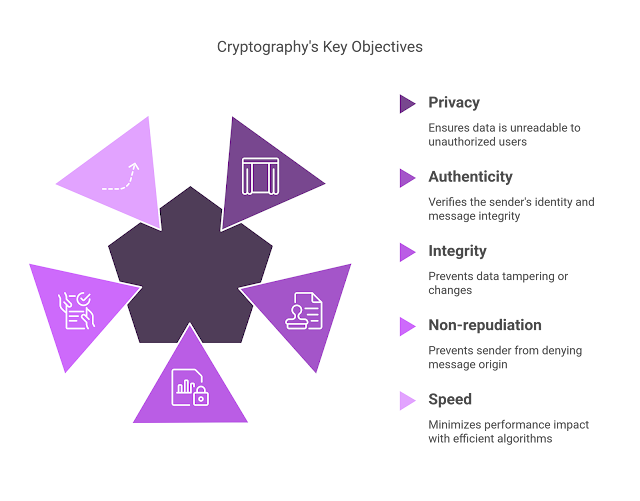In today's digital age, cryptography is essential for protecting sensitive information from unauthorized access and cyber threats. It's the art and science of transforming data into an unreadable format (ciphertext) to ensure only authorized parties can access it. Cryptography is fundamental to modern cybersecurity, forming the bedrock for secure communication and data protection.
Why is Cryptography Important?
Cryptography plays a vital role in our daily lives, ensuring the security of sensitive data like credit card numbers, e-commerce transactions, and online communications. It's crucial for maintaining national security, safeguarding classified information, and building trust in the digital world. Cryptographic solutions offer several key advantages:
- Confidentiality: Encryption transforms sensitive information into an unreadable format, ensuring only authorized individuals with the correct decryption key can access it.
- Integrity: Cryptography prevents data from being altered or tampered with during transmission or storage. Hash functions and message authentication codes (MACs) are used to detect any modifications.
- Authentication: Cryptography verifies the identities of users, devices, and systems, ensuring they are who they claim to be. Public Key Infrastructure (PKI) and digital signatures are used to establish trust and prevent unauthorized access.
- Non-repudiation: Cryptography ensures that the sender of a message cannot deny having sent it. Digital signatures and audit logs provide proof of origin and integrity.
How Cryptography Achieves Key Objectives:
- Privacy (Confidentiality): Cryptography ensures privacy by encrypting data, making it unreadable to unauthorized users. Encryption algorithms transform data to ensure only the correct recipient can decrypt the message.
- Authenticity (Verification of Identity): Cryptography verifies the identity of the sender and ensures the message has not been altered. Message authentication codes (MACs) and digital signatures are used to confirm the message's origin and integrity.
- Integrity (Data Tamper-Proofing): Cryptography ensures that data has not been tampered with or changed. Hash functions combine all bytes in the message with a secret key to generate a message digest that is difficult to reverse.
- Non-repudiation (Proof of Origin): Cryptography prevents the sender of a message from denying they sent it. Digital signatures provide a way to verify the sender and ensure they cannot deny sending a message.
- Speed (Efficient Encryption & Decryption): While traditionally, cryptographic operations could cause delays, modern cryptography includes advancements like optical cryptography and efficient algorithms to minimize performance impact. Symmetric encryption, for example, is comparatively fast.
Cryptography is a cornerstone of modern cybersecurity, providing the tools and techniques necessary to protect sensitive information, ensure secure communication, and build trust in the digital world. Its continued evolution is crucial to address emerging cyber threats and maintain the security and privacy of our digital lives.
References:
- https://www.amu.apus.edu/area-of-study/information-technology/resources/cybersecurity-and-cryptography/
- https://csrc.nist.gov/glossary/term/cryptography
- https://www.sectigo.com/resource-library/cryptography-importance-how-its-changing
- https://www.ibm.com/think/topics/cryptography
- https://cloud.google.com/learn/what-is-encryption
- https://jatheon.com/blog/data-at-rest-data-in-motion-data-in-use/
- https://fidelissecurity.com/cybersecurity-101/learn/what-is-hashing/
- https://www.cisa.gov/news-events/news/understanding-digital-signatures
- https://www.bitsight.com/glossary/non-repudiation-cyber-security
- https://support.microsoft.com/en-us/office/digital-signatures-and-certificates-8186cd15-e7ac-4a16-8597-22bd163e8e96
- https://www.cloudflare.com/learning/privacy/encryption-and-privacy/
- https://www.ibm.com/think/topics/cryptography-use-cases
- https://csrc.nist.gov/glossary/term/message_digest




